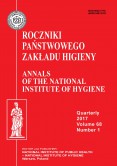Rocz Panstw Zakl Hig 2015, 66(3): 253-260
Assessment of nutritional habits and preferences of children and adolescents brought up in Krakow’s orphanages.
[Assessment of nutritional habits and preferences of children and adolescents brought up in Krakow’s orphanages.]
ABSTRACT
Background. Proper nutrition can not only guarantee harmonious child’s development, but can also protect against later development of diet-related diseases such as type-2 diabetes, obesity or cardiovascular diseases. Many diseases as well as disorders of intellectual development of a young people may result from the mistakes made in a period of an intense growth and maturing of a child.
Objective. The aim of this study was to assess nutritional habits and preferences in subjects brought up in orphanages in terms of subjective evaluation of eating patterns, frequency of the meal consumption, and a concern about healthy life style.
Material and Methods. This study has been conducted to evaluate nutritional habits and preferences of 181 children aged 9-20, from orphanages in Krakow. Study was performed in 2007-2008 in 5 orphanages, which were under the control of Social Welfare Centre. Evaluation of nutritional habits and preferences was performed on the basis of an anonymous 8-question questionnaire adjusted to the respondent’s age, which referred, among other, to questions about subjective assessment of eating patterns, frequency of meal consumption and the concern about healthy lifestyle patterns.
Results. About 75% of the examined population responded affirmatively to a question about subjective assessment of proper eating patterns; 80% female and 88% male respondents declared a regular consumption of meals. Daily diets of children in orphanages consisted usually from 5 or 4 meals (respectively 38 and 33% of affirmative responses); although, 5 meals were most often eaten by the youngest children. Furthermore, it has been revealed that milk and dairy products were consumed, on average, by 66% of respondents. On average, 76% of respondents reported everyday consumption of the lean meat, while 72% ate fish at least once per week.
Conclusions. Results obtained in this study, identify the improper nutritional habits and indicate the necessity of intervention, consisting on training courses and workshops for children, adolescents and their teachers.
STRESZCZENIE
Wprowadzenie. Właściwe żywienie może nie tylko zapewnić harmonijny rozwój dziecka, ale może też zapobiec późniejszemu rozwojowi wielu chorób dietozależnych, takich jak cukrzyca typu 2, otyłość czy choroby układu sercowo-naczyniowego. Błędy żywieniowe w okresie intensywnego wzrostu i dojrzewania mogą być także przyczyną wielu chorób i zaburzeń rozwoju intelektualnego młodego człowieka.
Cel. Celem podjętych badań była ocena zwyczajów oraz preferencji żywieniowych wychowanków krakowskich domów dziecka, w zakresie wybranych aspektów.
Materiał i metody. W badaniach uczestniczyło 181 wychowanków. Wiek dzieci objętych badaniami mieścił się w granicach od 9 do 20 lat. Badania wykonywano w 5 domach dziecka w latach 2007-2008. Ocena zwyczajów i preferencji żywieniowych opierała się na anonimowym kwestionariuszu obejmującym 8 pytań, i dotyczyła subiektywnej oceny tzw. ”zdrowego” stylu życia, częstotliwości spożywanych posiłków i wybranych grup produktów spożywczych.
Wyniki. Na pytanie odnoszące się do subiektywnej oceny prawidłowego sposobu żywienia twierdząco odpowiedziało ok. 75% ankietowanej populacji. Regularne spożywanie posiłków deklarowało 80% wychowanek i 88% wychowanków. Całodzienne racje pokarmowe młodzieży krakowskich domów dziecka najczęściej składały się z 5 lub 4 posiłków (kolejno 38 i 33% twierdzących odpowiedzi), przy czym spożycie 5 posiłków najczęściej deklarowali najmłodsi wychowankowie. Ponadto wykazano, że po mleko i jego przetwory sięga średnio 66% wychowanków. Codzienne spożywanie chudego mięsa i jego przetworów deklarowało średnio 76% ankietowanych, a spożycie ryb, co najmniej raz w tygodniu, deklarowało 72%.
Wnioski. Uzyskane wyniki badań, wskazują na niewłaściwe nawyki żywieniowe i uzasadniają konieczność interwencji, polegającej na prowadzeniu warsztatów, szkoleń wśród ocenianej populacji dzieci i młodzieży oraz ich opiekunów.
Downloads: 2676


